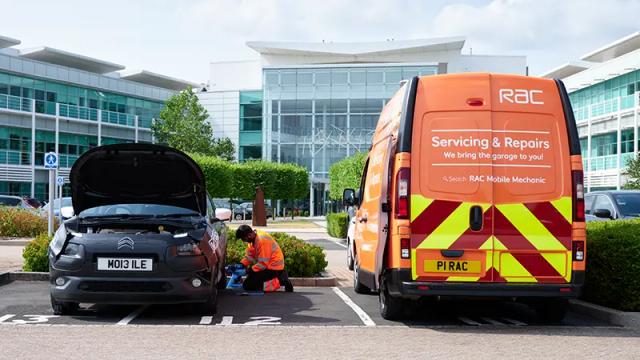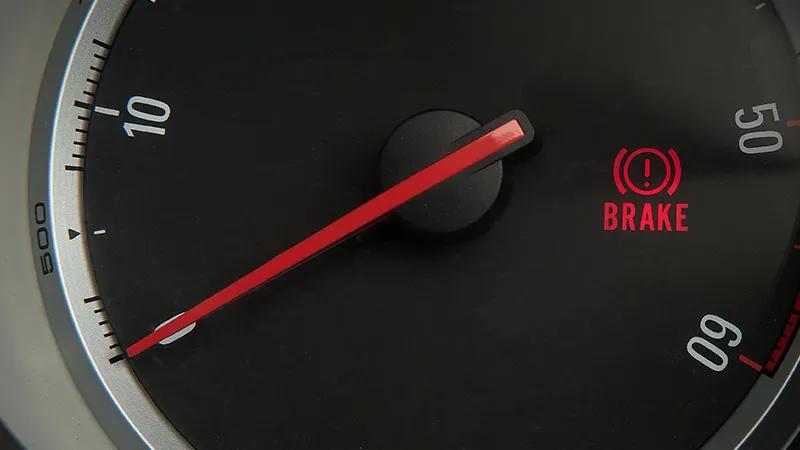Why choose RAC Mobile Mechanics for a brake pad and disc replacement?
At the RAC, we've got over 125 years' experience helping UK drivers. We have the skills and knowledge to keep your vehicle running. Plus, with RAC Mobile Mechanics, you can avoid the hassle of taking your vehicle to a garage when you need a repair. We’ll come to you, at your home or work.

Top-quality brakes
With a 12-month guarantee as standard.

Price includes fitting
Fitting included with no hidden extras.

Maximum convenience
Get your brakes replaced on your doorstep in as little as 2 days.
RAC Mobile Mechanic
RAC Mobile Mechanic

At the RAC, we’ve got over 125 years’ experience in offering complete peace of mind to our members. We’re best known for our breakdown service. And now – our new RAC Mobile Mechanics are here to help make every day motoring easier. If you need a service or repair, they’ll come to you at your home or work.

Brake pads and discs replacement
From £149**
If your brakes are making noise or you’re noticing reduced stopping power, it’s likely time to replace your brake pads or discs. Our mobile mechanics can come to you at home or work to replace them, all without the hassle of getting to a garage!

Vehicle diagnostic check
£99
For when you know something isn’t right, but you’re not sure what – our mobile mechanics are here to help.
Content Guide
Introduction
Brake pads play an essential role in making sure your vehicle stops safely. Knowing when to replace brake pads and understanding the costs involved can help you maintain your vehicle in a timely and affordable way.
What is a brake pad?
A brake pad is a component in your car's braking system that creates friction against the brake disc (rotor) to slow down or stop your vehicle. They come in various types, including ceramic, semi-metallic, and organic.
What causes the brake pad to need replacing?
Several factors can cause brake pads to wear out and need replacing:
- Friction and heat: Constant friction and heat during braking wear down the brake pads over time.
- Driving habits: Frequent braking, especially in stop-and-go traffic, accelerate wear.
- Environmental conditions: Driving in hilly or mountainous areas can increase brake pad wear.
- • Quality of brake pads: Higher-quality pads may last longer than cheaper alternatives.
Regular checks and timely replacements will help to make sure your brakes function properly.
What are the symptoms of brake pads needing replacing?
Signs that your brake pads need replacing include:
- Squealing or screeching noise: A high-pitched noise when braking often indicates worn brake pads.
- Grinding sound: A grinding noise when you brake suggests the brake pads are completely worn out, and metal is rubbing against metal.
- Reduced braking performance: Longer stopping distances and reduced braking efficiency are signs of worn brake pads.
- Vibrations: Feeling vibrations through the brake pedal when braking is a good indicator of worn or uneven brake pads.
If you notice any of these symptoms, get your brake pads checked.
Minimum brake pad thickness
The minimum brake pad thickness for safe operation is typically around 3mm (about 0.12 in). Most new brake pads start with a thickness of about 12mm (about 0.47 in). As the brake pad wears down to 3mm (about 0.12 in), it’s time to consider replacing them. Driving with brake pads thinner than 3mm (about 0.12 in) can compromise braking performance and safety.
What is a brake pad warning light?
Most modern vehicles have a brake pad warning light on the dashboard. This light activates when the brake pads are worn down to a certain level. If the brake pad warning light comes on, get your brake pads inspected and replaced if necessary. Continuing to drive will only worsen the damage, and could cause a safety hazard as time runs on.
Brake pad replacement cost
The cost of replacing brake pads varies based on a few different factors:
- Type of vehicle: The make and model of your car can affect the cost.
- Type of brake pads: Different materials (ceramic, semi-metallic, organic) have different price points.
- Labour costs: The labour rates of the mechanic or garage can vary.
On average, brake pad replacement costs range from £100 to £300 per axle, including parts and labour. If you’re looking to get the best price, it’s important to get detailed quotes from multiple mechanics before having the work done.
Replacing worn or faulty brake pads is important for maintaining your vehicle’s braking performance and safety. If you notice any symptoms of worn brake pads or the brake pad warning light comes on, it is time to get them checked. Mobile mechanics offer convenient brake pad replacement services at your home or workplace, making sure you stay safe on the road.
Frequently Asked Questions on brake pads and discs repair
Brake pads typically need replacing every 20,000 to 70,000 miles, but this depends on your driving habits and the type of brake pads you use. Regular inspections can help determine the right time for replacement.
Yes, if you have the necessary tools and mechanical knowledge, you can replace brake pads yourself. However, unless you’re a trained mechanic, it’s safer and more efficient to entrust the work to a trained professional.
Worn brake pads often cause squealing or grinding noises, reduced braking performance, and vibrations when braking. Visual inspections can also reveal thin brake pads that need replacing.
You may need new brake discs if you experience vibrations when braking, see grooves or score marks on the disc, or notice a longer stopping distance. A professional inspection can confirm if the brake discs need replacing.
Brake discs last longer than brake pads and typically need replacing every 50,000 to 70,000 miles. The exact lifespan depends on driving conditions and habits.
To check your brake pads yourself:
- Look through the wheel spokes: You should see the brake pad pressed against the brake disc.
- Measure the thickness: If the pad is less than 3mm (about 0.12 in) thick, it needs replacing.
- Listen for noises: Squealing or grinding noises indicate worn pads.
If you spot anything unusual or out of the ordinary, make sure you speak to a mechanic as soon as possible.
Brake fade occurs when the braking system overheats and loses its ability to generate friction. This can happen after continuous hard braking, such as driving down a steep hill. A brake fade reduces braking performance and can be dangerous.
Replacing both brake pads and discs can cost between £200 and £500 per axle, depending on the vehicle and type of parts used. Get multiple quotes to make sure you’re getting the best deal.
Driving with worn brake pads can compromise your safety and damage other braking components in your vehicle. It is best to replace them as soon as you notice they are worn.
Yes, there are several types of brake pads:
- Ceramic brake pads: Known for being quiet and producing less dust.
- Semi-metallic brake pads: Durable and effective but can be noisy.
- Organic brake pads: Made from non-metallic materials, they are quieter but wear out faster.
Each type has its pros and cons, so choose based on your driving needs.
Brake pads are components that press against the brake discs (rotors) to create friction and slow the car. Brake discs are the rotors attached to the wheels that the brake pads clamp onto. Both are essential for effective braking.
To extend the life of your brake pads:
- Drive smoothly: Avoid hard braking whenever possible.
- Maintain a safe distance: This reduces the need for sudden stops.
- Regular inspections: Check your brake pads regularly to catch wear early. Inspection should form part of your yearly service.
A brake pad replacement typically takes about 1 to 2 hours per axle, depending on the vehicle and the mechanic's experience. If additional repairs are needed, it might take longer.
Yes, you can upgrade to high-performance brake pads for better braking performance. Consider options like ceramic or semi-metallic pads if you need improved durability and stopping power.
If the brake warning light comes on, it usually indicates that your brake pads are worn or there is another issue with the braking system. To avoid progressive damage to your vehicle, get your brakes checked out by a professional as soon as you can.
Brakes can squeal for several reasons:
- Worn brake pads: Low pads can cause squealing.
- Glazed pads: Overheating can glaze the pads and cause noise.
- Dust and debris: Accumulation can cause squealing.
Regular maintenance and timely replacements can prevent squealing.
A brake pad sensor is a small device that alerts you when your brake pads are worn and need replacing. It activates the brake warning light on the dashboard when the pads reach a certain wear level.
Yes, a mobile mechanic can replace your brake pads at your home or workplace. This service offers convenience and ensures your brakes are in good condition without needing to visit a garage.
Yes, driving with worn brake pads can damage other parts of your vehicle, such as the brake discs and calipers. This can lead to more expensive repairs, so it’s best to have any issues seen to as soon as you notice them.
Signs that your brake discs need replacing include vibrations when braking, grooves, or score marks on the disc, and a longer stopping distance. A professional inspection can confirm if the discs need replacement.
If your car judders when braking, it could indicate warped brake discs or unevenly worn brake pads. Have your braking system inspected and repaired by a professional.
Brake pads are usually considered a wear-and-tear item and probably won’t be covered under standard warranties. However, some premium brake pads come with a limited warranty, so it’s worth checking the details when you buy.
- OEM brake pads: Made by the vehicle manufacturer or an approved supplier. They match the original specifications.
- Aftermarket brake pads: Made by third-party manufacturers. They can offer a wider range of options but vary in quality.
Both options have their pros and cons. Talk to a mechanic to choose the best for your needs.
Filter by

